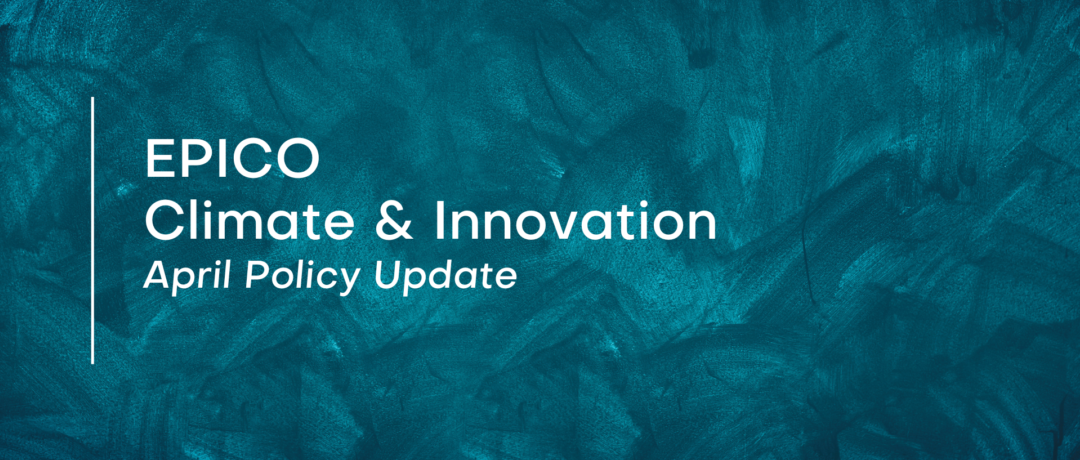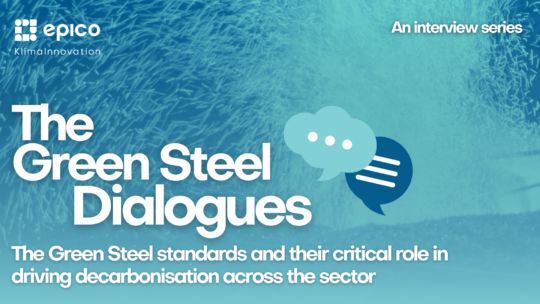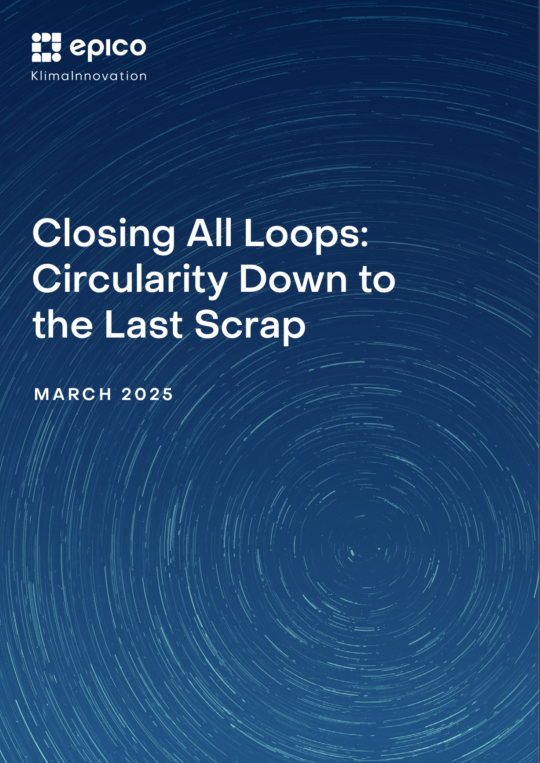
Braving the storm: turning a crisis into an opportunity for Europe’s climate future
Welcome to our April Policy Update!
Spring has fully arrived in Brussels, but as we soak up the sunshine, storm clouds are gathering elsewhere: with a trade war unfolding - and new tariffs unveiled on ‘Liberation Day’, international markets and the global order are shaking up.
What does this mean for climate policy? In Europe, it translates to the European Parliament voting to deregulate corporate reporting, the Commission rolling out the Steel and Metals Action Plan to strengthen manufacturing, and Finland completing its coal phase-out. The road to net-zero therefore continues, but with an eye to Europe’s competitiveness, at stake in a world undergoing yet another disruptive shock.
At EPICO, we’re tackling exactly this challenge. Over in Berlin, as the coalition talks wrap up and a final agreement takes shape, our latest strategy paper provides key insights for the next German government on boosting competitiveness, while our new Policy Paper showcases how to unlock private capital for the energy transition, shifting away from reliance on subsidies. Meanwhile, in Brussels, we’ve turned our focus to circularity, with a new Policy Brief offering recommendations to advance the EU’s waste sector. We’re also keeping the green steel conversation going after our policy report on steel decarbonisation, with a fresh series of interviews titled "The Green Steel Dialogues." You can read more about this below.
As we moved the clocks forward, we also landed on a new platform: EPICO is now on Bluesky! Follow us at @epicothinktank.bsky.social for fresh insights and updates as we build a climate community on this new platform.
NEW BLOG POST: Introducing the Green Steel Dialogues

The Green Steel Dialogues is EPICO’s new interview series diving into the thorniest policy questions shaping the decarbonisation of steel in the EU and beyond. With a spotlight on Germany and Europe’s role in the global industrial transition, the series offers a platform for voices from industry, civil society, and policymaking to unpack competing approaches to what constitutes “green” or “low-emission” steel. Published on a rolling basis, each edition links expert perspectives to EPICO’s own proposals from our report Ironing Out the Transformation of EU Steelmaking, bringing the technical and political debate into sharper focus.
In the first edition, Julian Parodi, our steel expert, sits down with Adina Adler, Executive Director of the Global Steel Climate Council (GSCC), to discuss why definitions of green steel matter and who gets to shape them. Adler raises concerns over "sliding scale" standards that allow high-emission producers to appear clean on paper while undercutting truly low-emission pathways like Electric Arc Furnaces (EAFs) powered by renewables. She highlights the GSCC’s global standard as a practical, technology-neutral framework that supports transparency and rewards real progress, not just good PR. With steel’s regulatory future taking shape in Brussels, Adler’s message is clear: Europe must not overlook the contributions and potential of scrap-based steelmaking.
Steel is the backbone of our green transition - if you’re curious about how the EU can create a level playing field for all decarbonisation pathways, or why some producers are resisting change, click here to read the full post.
NEW PUBLICATION: Closing All Loops: Circularity Down to the Last Scrap

In a truly circular economy, nothing is wasted - not even waste itself. Yet across Europe, valuable materials still slip through the cracks of a fragmented system, ending up in landfills or incinerators instead of being recovered and reused. As the EU accelerates its shift away from the linear ‘take-make-dispose’ model, closing these loops has become a strategic imperative for delivering on sustainability and competitiveness goals.
EPICO’s latest policy brief aims to provide a solution to this challenge. “Closing all Loops: Circularity down to the last scrap” presents concrete recommendations to unlock the full potential of circularity in the EU’s waste sector. Building on insights from our December 2024 Policy Accelerator, the brief proposes three clear actions: establishing a functional European waste market through Carbon Contracts for Difference (CCfDs); developing a transition pathway that integrates waste-to-energy with the EU ETS while respecting the waste hierarchy; and creating an EU Circular Economy Waste Fund to drive investment in infrastructure, innovation, and capacity building.
Building on insights from EPICO’s Policy Accelerator, the brief translates complex waste policy debates into actionable steps, setting out a vision for how circularity can truly become a cornerstone of Europe’s climate and industrial ambitions. Read here the full Policy Brief.
NEW PUBLICATION: Unlocking Private Capital for the Energy Transition (in cooperation with IW Köln and Bellona)

At EPICO, we're addressing a crucial challenge that Europe faces today: unlocking private capital for the energy and climate transition. With the EU working towards completing the Savings and Investment Union, the urgency to create a sustainable, market-driven financing system has never been greater. Amid economic uncertainty and growing trade tensions, the need to find resources locally is becoming increasingly important. However, relying solely on subsidies is not the answer. In our latest study, developed in collaboration with the German Economic Institute and Bellona Deutschland, we explore how to design a financing framework that mobilises private investment, reduces risks, and supports small and medium-sized enterprises (SMEs) and emerging technologies.
The paper outlines five critical policy levers: reducing grid expansion costs, mobilising capital markets, improving access to credit and risk hedging tools, using Contracts for Difference as a transitional mechanism, and establishing lead markets to build investor confidence. These measures are key to unlocking the private capital necessary for an affordable, competitive, and sustainable energy transition, without overburdening public budgets or taxpayers.
In the full paper, we lay out actionable steps to break the investment deadlock and accelerate Europe's climate transition. Discover how this approach can help secure the resources Europe needs in these turbulent times; you can find the paper, in German, here.
NEW PUBLICATION: New Impulses for a Real Economic Transition: Reframing Energy and Climate Policy for the Next Government

As coalition talks draw to a close in Germany, and the agreement now heads to party members for a vote, attention is shifting to what comes next. The country stands at a critical economic juncture, but so far, political responses have largely centred on new funding promises rather than structural reform. With Germany facing mounting competitiveness challenges, the next government must move beyond short-term fixes and lay the foundation for long-term, sustainable growth.
With these premises in mind, EPICO has developed a new strategy paper that charts a course for actionable, politically feasible reforms. It highlights how to expand the energy supply, reform renewable subsidies, and establish lead markets for climate-neutral products such as steel. The paper also proposes integrating gas power tenders, cutting bureaucracy in the building sector, accelerating the hydrogen rollout, and introducing a Carbon Management Strategy 2.0, all while unlocking private capital and preserving the federal budget.
This strategy builds on a clear-eyed assessment of Germany’s current economic challenges and the urgent need for structural change. Grounded in market-based principles and investment incentives, it outlines what’s needed to secure competitiveness, deliver effective climate action, and put the economy on a sustainable path. The full publication is available here in German.
EPICO is on Bluesky!
As the digital world evolves, so does where we gather to exchange ideas. What was once a familiar space has changed, and we’ve been looking for a new place where conversations stay meaningful and open. Enter Bluesky - the new digital town square where the real, informed discussions are happening now, and we're excited to be part of it.
We’re always looking for ways to push forward on our mission for a sustainable, net-zero future. That’s why we’re thrilled to join Bluesky! It’s the perfect place for us to bring more of the insights and policy updates you know us for, all focused on Europe's clean industrial transition. Let's connect! You can find us at @epicothinktank.bsky.social
Spotted: EPICO in the Media
- We co-organised a high-level event in Berlin with the Konrad-Adenauer-Stiftung (KAS), where onshore CO₂ storage took centre stage—signalling a shift in the political debate around CCS in Germany. Read the article in Energate.
- Our joint event with KAS in Berlin also made headlines in Tagesspiegel Background, where key industry voices pushed for domestic carbon storage as part of a credible CCS strategy. Check out the article here (in German).
- Energate wrote about out joint policy paper with IW Köln and Bellona, calling for the creation of special purpose vehicles (SPVs) to unlock private capital for the energy transition. Read it here.
- Our recommendations on financing the energy transition were also featured in Handelsblatt, in an article exploring how Germany can mobilise the trillions needed for transformation. Check it out here (in German).
- Our Policy Specialist Simon Munkler shared his perspective in Table.Media, arguing that the German Building Energy Act (GEG) needs a pragmatic middle ground between energy efficiency and emission reductions. You can find his op-ed here (in German).
- Our Director for Energy and Industry Joachim Schmitz-Brieber published an op-ed in Energate, calling for overdue structural reforms to secure a more sustainable and competitive industrial policy in Germany. Read the op-ed here (in German).
- Joachim Schmitz-Brieber also joined the Jolt podcast to unpack Germany’s climate strategy after the next federal election and how to move from short-term crisis management to long-term resilience. Listen to the episode here.
- EPICO’s recommendations paper was cited in Münchner Merkur in an article exploring CDU leader Friedrich Merz’s economic positioning—highlighting the climate and energy measures needed to align with fiscal responsibility. Read the article here (in German).
- Our recommendations paper also featured in Handelsblatt, where it was presented as a cost-effective blueprint for realigning Germany’s energy transition with competitiveness goals. Check out the article here (in German).
- Our Founder and CEO Bernd Weber wrote an op-ed in Table.Media, arguing that Germany must take a leading role in shaping the hydrogen economy—and that current efforts fall short of this ambition. Read it here (in German).
- Julian Parodi, EPICO’s EU Policy Specialist for Industrial Decarbonisation, was quoted in Table.Media on the EU’s Strategic Metals for Autonomy Plan (SMAP), analysing how the Commission aims to curb protectionism while supporting industrial sovereignty. You can read the full article here (in German).
Are you a climate and energy journalist looking for new voices to interview? REACH OUT to EPICO’s Senior Communications Specialist Agata Gurgenidze (Germany) and EU Communications and Media Specialist Michela Sandron (EU).
